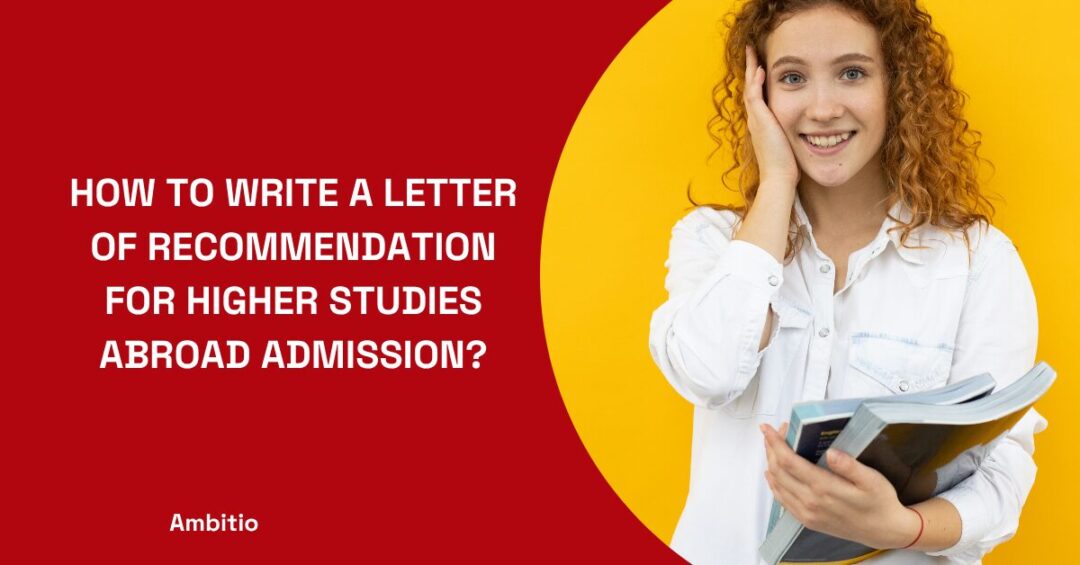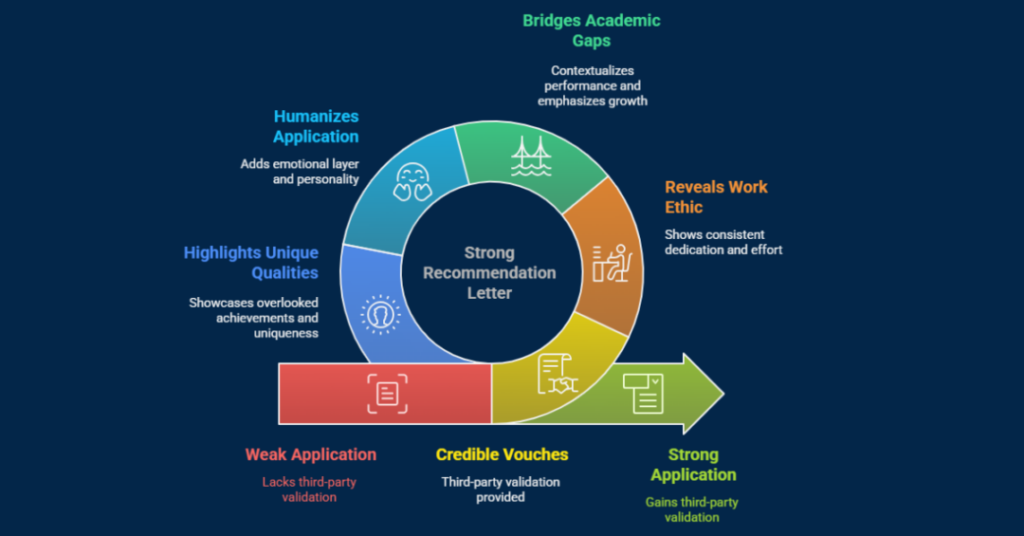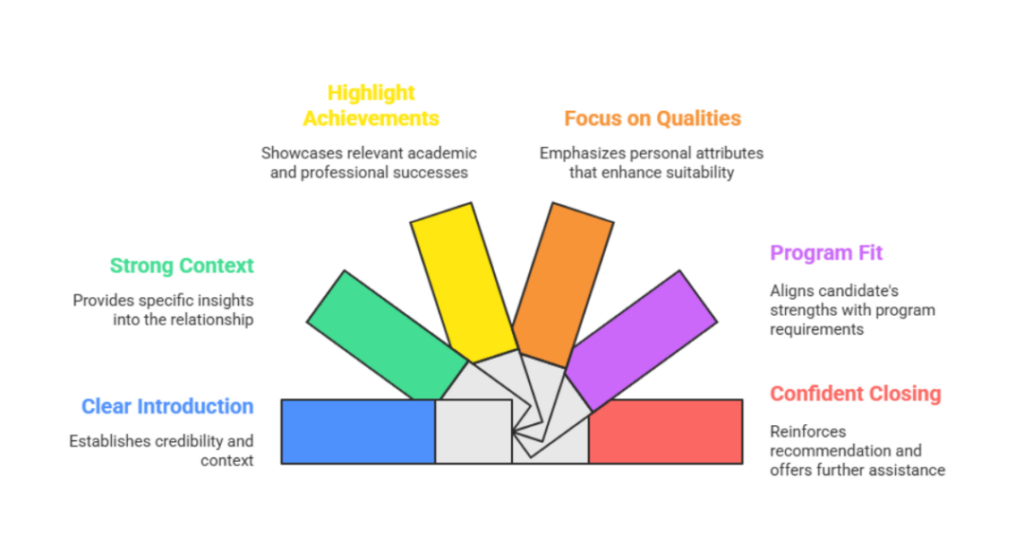7 July 2025
7 minutes read
How To Write A Letter Of Recommendation For Higher Studies Abroad Admission?

Key Takeaways
- Letter of recommendation for higher studies carries weight equal to your GPA and can influence admission decisions more than you think
- Structure, specificity, and sincerity are what turn a generic LOR into a compelling recommendation that stands out
- Admission committees value real stories, relevant achievements, and proof of academic and personal potential
Roughly 70% of rejected study abroad applications cite weak or vague recommendation letters as a red flag—and honestly, the admission committee can smell a lazy copy-paste job from a mile away. Most referees either overpraise without proof or dump a resume recap, thinking that’ll do the trick.
But a real letter of recommendation? It captures the applicant’s grit, academic and professional promise, work ethic, and yes, even their quirks—like leading a project and the debate club. To write one that truly recommends, not just describes, you need to be specific, sincere, and structure it right—think less “template,” more “tailored story that sticks.”
Why A Letter Of Recommendation Is So Important For Higher Studies?
No one actually enjoys writing a letter of recommendation. It’s that awkward professional favor everyone needs but no one’s quite sure how to nail. Yet, here’s the punchline: in the high-stakes game of study abroad admissions, your LOR can weigh just as much as your GPA. Why? Because while grades show what you’ve done, a powerful recommendation letter reveals who you are when no one’s watching.

The admission committee isn’t just looking for another applicant with a shiny resume—they want a person who shows potential, character, and commitment through the eyes of someone who’s seen them excel in the real world. Now let’s break down why this document—often underestimated and poorly written—is actually a dealmaker in your graduate studies journey:
1. It’s the Only Place Someone Else Vouches for You—Credibly
An LOR gives the admission committee what no transcript or SOP can: third-party validation. When a respected professor or employer takes the time to recommend you, they’re putting their reputation on the line to prove your suitability for that program. It’s not just a formality—it’s social proof, and trust us, it matters.
2. It Reveals Your Work Ethic When No One’s Watching
A well-written letter of recommendation doesn’t just say you’re hardworking—it shows how you consistently met deadlines, led initiatives, or supported team goals when there was no applause. This kind of insight into your academic and professional behavior is gold for an admission committee sizing up an applicant’s long-term potential.
3. It Bridges the Gaps Your Grades Can’t Explain
Let’s say your academic performance dipped one semester—or maybe you took an unconventional path in your extracurricular choices. A strong recommendation letter can contextualize these moments. It helps emphasise your growth, adaptability, and how you bounced back—something no sample letter of recommendation template ever truly captures.
4. It Humanizes Your Application
Data points can’t tell stories. A personalised recommendation letter adds that emotional layer—showcasing who you are beyond bullet points. It gives the admission committee a clear picture of your personality, passions, leadership traits, and even how you sign off an email (yes, your salutation style can say a lot).
5. It Highlights Qualities That Make You Stand Out
Anyone can list achievements. But an impactful LOR sheds light on the things others missed—how you balanced extracurricular overload with stellar academic performance, mentored juniors, or pushed boundaries in a group project. These detailed anecdotes emphasise your uniqueness and help your profile rise above hundreds of others in the study abroad pile.
6 Elements To Include In A Recommendation Letter
most recommendation letters out there sound like they were written by a tired professor half-asleep at 2 AM with a thesaurus in one hand and a sample LOR from Google in the other. That’s why writing this letter properly—especially for something as competitive as a master’s application—requires more than just a few generic praises and recycled phrases. A well-written LOR can actually tilt the balance of a university decision in your favor, especially if you wish to study in a top-tier international program.

So if you’re planning to write a letter of recommendation (or get a letter) for higher studies abroad, here’s a brutally honest breakdown of the six must-have elements that’ll make your LOR stand out in a sea of mediocrity:
1. Clear Introduction With the Right LOR Format
Start strong. A formal letter always begins with a clear introduction that identifies the student name, your relationship with the applicant, and how long you’ve known the student. Mention if the letter is written for a specific program—say, an MS in Computer Science or an MBA—and that you’re pleased to write this letter. Use a tone that reflects genuine confidence in the candidate without sounding robotic. Admissions officers can spot filler from a mile away.
2. Strong Context About the Relationship With the Student
This is where most LOR samples fall flat. Instead of just saying you’ve worked closely with the student, provide specific insights into your relationship with the student or how you’ve seen them grow during their undergraduate study. Whether you were their professor, mentor during research projects, or manager in an internship—be clear. A strong LOR stems from someone who knows the student well, not someone who clicked “send” as a favor.
3. Highlight Academic and Professional Achievements With Examples
This isn’t just about listing grades—that’s what academic transcripts are for. What you need here are examples that illustrate academic and professional achievements, academic skills, or professional achievements that are relevant to the program. Maybe the student showed academic excellence in data science, took initiative in class debates, or went the extra mile on a team project. These specific achievements make for an effective recommendation—one that screams: “This person will thrive in your academic environment.”
4. Focus on Personal Qualities That Make the Candidate Stand Out
Academic success is great, but what really seals the deal are personal qualities that make someone great to work or study with. Does the student have leadership skills? An interest in learning new things? Do they collaborate well? Show integrity? This section is where you highlight your academic and academic and personal impressions of the student. Make it real. No sugar-coating. Authentic praise backed by academic potential always wins.
5. Fit for the Master’s Program & Career Goals
Here’s your chance to emphasise the student’s suitability as a candidate for the course. Make it relevant to the program—talk about how their strengths align with the program details, or how their goals match the ethos of university name. A good LOR goes beyond praising the student and instead explains why they belong in that particular program. It’s a compelling recommendation, not a character reference.
6. Confident Closing With Contact Willingness
A proper closing matters. Summarise your strong recommendation and add that you’d be happy to provide specific answers to frequently asked questions or require any further information. Sentences like “feel free to contact me” or “I would like to highlight their strong candidacy” wrap up your letter of recommendation for masters with purpose. The tone should remain formal, confident, and direct—exactly what admissions panels respect.
What Are The Other Documents You Need To Get Admission In Masters Program?
Letters of recommendation are not the only thing that can guarantee admission. In fact, there is no single document that seals the deal for your master’s application. Admission committees look at the whole picture—your test scores, academic background, goals, and even how well you communicate on paper. If you’re serious about higher studies abroad, you need a complete, well-prepared package that reflects your academic and professional journey.
Here’s a quick breakdown of the other essential documents (and exams) you’ll need when applying to a master’s program abroad:
| Document/Exam | Purpose |
|---|---|
| Statement of Purpose (SOP) | Explains your academic background, career goals, and why you’re applying to that specific program. |
| Academic Transcripts | Official records of your grades and courses from your undergraduate study. |
| CV/Resume | Summarizes your academic and professional achievements, research, internships, and extracurricular activities. |
| GRE (Graduate Record Exam) | Required by many US universities for STEM and business-related master’s degrees. |
| GMAT (Graduate Management Admission Test) | Needed for business schools and MBA programs to assess quantitative and verbal reasoning. |
| TOEFL (Test of English as a Foreign Language) | Measures English proficiency for students from non-English speaking countries. |
| IELTS (International English Language Testing System) | Another widely accepted English language proficiency test. |
| Duolingo English Test | A convenient, online English test that many universities now accept as an alternative to TOEFL/IELTS. |
| Passport Copy | Required for identity verification and international admission processes. |
| Portfolio (for Design/Arts Programs) | Showcases creative work for applicants to design, architecture, or fine arts programs. |
| Research Proposal (if applicable) | Needed for research-based master’s programs, especially in fields like science, social work, or humanities. |
| Application Form | The official form submitted to the university via their portal. |
| Application Fee Receipt | Proof of payment for the application processing fee. |
Conclusion
Your letter of recommendation isn’t just another document—it’s a reflection of how others see your potential. Pair that with a solid SOP, honest transcripts, and a clear vision, and you’re already ahead of most applicants.
But don’t overthink perfection. Focus on clarity over fluff, substance over style. And remember—admission committees aren’t looking for flawless students; they’re looking for focused, self-aware individuals who know why they’re applying and where they’re headed. Keep it real, keep it tight, and most importantly—make it count.
Most students settle for boring, copy-paste LORs—but yours won’t. At Ambitio, our experts help you craft sharp, personalized letters of recommendation that actually say something—and make decision-makers pay attention. No templates, no fluff—just real impact, written right. Get your letter of recommendation done with Ambitio Elite.
FAQs
What academic qualifications do I need?
You must have a relevant Bachelor’s degree from a recognized university, usually with a minimum of 60–70% marks depending on the country and university
Is work experience necessary?
Some universities and programs require prior work experience, so check specific course requirements before applying
What language proficiency tests are required?
Non-native English speakers typically need to submit scores from tests like IELTS, TOEFL, or PTE to prove English proficiency
Are GRE or GMAT scores mandatory?
GRE or GMAT scores are required for many programs, especially in the USA and Canada, but not always mandatory for all countries
What documents are needed for the application?
Common documents include Bachelor’s degree certificate, transcripts, English proficiency scores, GRE/GMAT scores (if required), statement of purpose, letters of recommendation, resume, and a valid passport
When should I start applying?
Start early, ideally 6-12 months before the program begins. For fall intakes, applications typically open from January to July

You can study at top universities worldwide!
Get expert tips and tricks to get into top universities with a free expert session.
Book Your Free 30-Minute Session Now! Book a call now




























